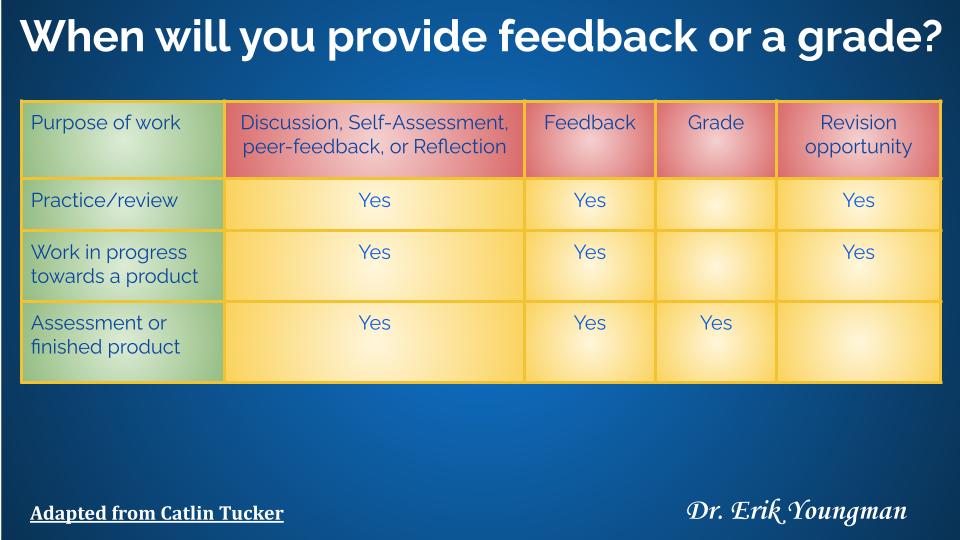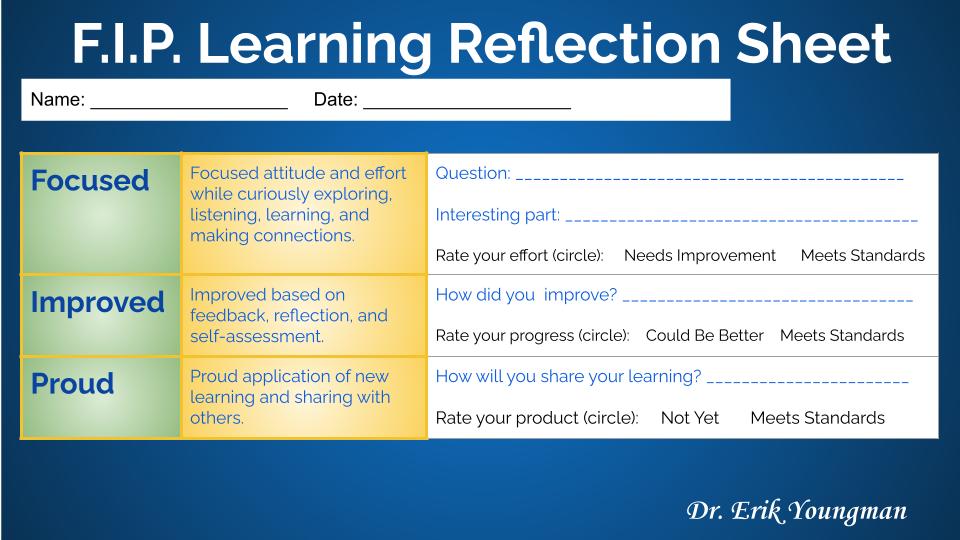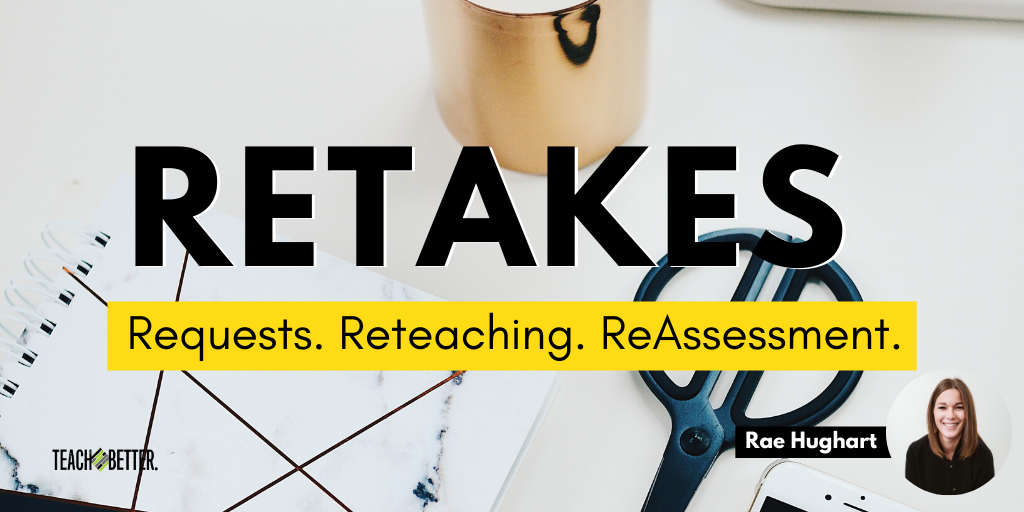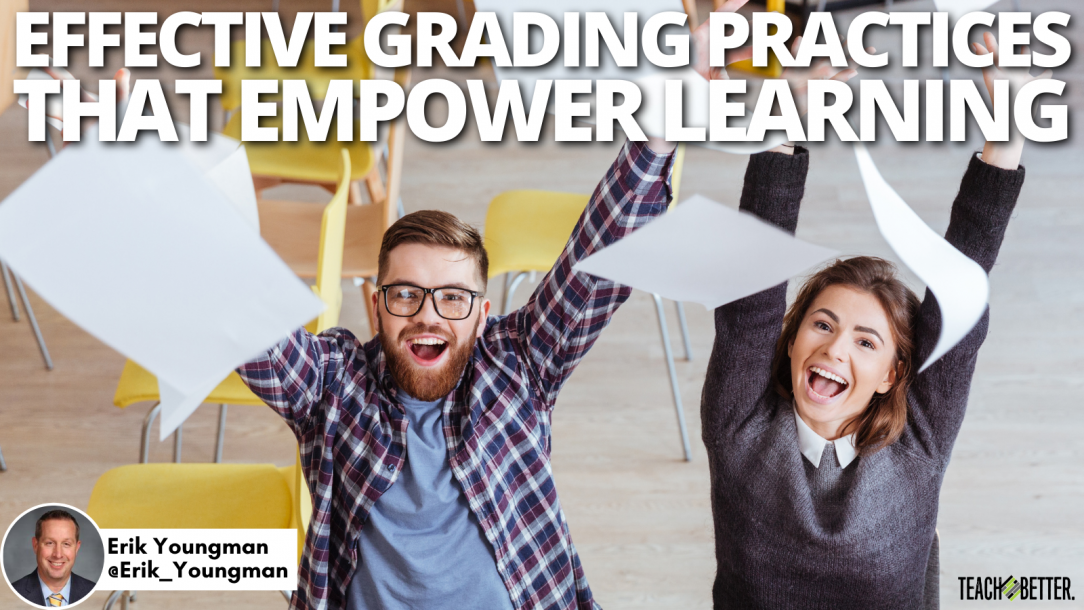TL;DR:
- Evaluate grading practices.
- Reflect on the use of assessments, feedback, and grades.
- Make changes to foster a growth mindset in students.
Effective grading recommendations made by Thomas Guskey, Rick Wormeli, and Ken O’Connor are ingrained in my beliefs about effective learning and grading practices. However, educators can review grading recommendations through the lens of the impact on students’ growth mindset to better understand the fairness, equity, and impacts of assessment, feedback, and grading practices.
Understanding the impact of grading practices enhances openness to reflecting on different grading practices. This blog will:
- Review grading recommendations through the lens of impact on a growth mindset for students.
- Simplify the decisions about when teachers should provide feedback or a grade.
- Empower reflection about an example of how we can modify grading practices for different learning units or topics in the classroom.
Assessment, Feedback, and Grading Practices
Noted below and summarized in the chart are assessment, feedback, and grading practices as well as a connected impact on students’ growth mindset. The explanations should enhance understanding about why effective grading practices can enhance learning, curiosity, and improvement. Aligning assessment complexity level with student abilities helps students appreciate challenges while making incremental progress. Providing feedback during the learning process that helps understand mistakes while empowering corrections, change, and incremental progress empowers students to seek and embrace feedback that guides improvement, reflection, and continuous improvement.
Empowering reflection about progress and goal-setting and not penalizing rough-draft thinking that occurs during the learning process inspires curiosity, risk-taking, exploration, deliberate practice, and proudly sharing work. Click To TweetEmpowering reflection about progress and goal-setting and not penalizing rough-draft thinking that occurs during the learning process inspires curiosity, risk-taking, exploration, deliberate practice, and proudly sharing work. Eliminating group grades and replacing unfair grading practices that are punitive empowers collaboration and inspiration from the success of others. Replacing unfair grading practices that are punitive inspires courageous and focused effort, attitude, and reflection when not experiencing success YET.
Reporting grades separately for each standard empowers students to self-assess strengths, progress, and areas to improve. Reporting academics and behavior grades separately enhance student and parent understanding about how effort, actions, attitude, and behavior impact performance and progress. Basing grades on recent evidence rather than averaging enhances focus on improving performance, efficiency, accuracy, and progress.
Impact on a Growth Mindset
| ASSESSMENT, FEEDBACK, OR GRADING PRACTICE | IMPACT ON A GROWTH MINDSET |
| Align assessment complexity level with student abilities | Appreciate challenges while making incremental progress |
| Provide feedback during the learning process that helps understand mistakes while empowering corrections, change, and incremental progress | Seek and embrace feedback that guides improvement, reflection, and continuous improvement |
| Empower reflection about progress and goal-setting | Inspire curiosity, risk-taking, exploration, deliberate practice, and proudly sharing work |
| Don’t penalize rough-draft thinking that occurs during the learning process | |
| Eliminate group grades | Empower collaboration and inspiration from the success of others |
| Replace unfair grading practices that are punitive | Inspire courageous and focused effort, attitude, and reflection when not experiencing success YET |
| Report grades separately for each standard | Self-assess strengths, progress, and areas to improve |
| Report academics and behavior grades separately | Understand how effort, actions, attitude, and behavior impact performance and progress |
| Base grades on recent evidence rather than averaging | Focus on improving performance, efficiency, accuracy, and progress |
When Teachers Provide Feedback or a Grade
Noted below is a table that was adapted from Dr. Catlin Tucker’s work. The table was created to simplify the decisions about when teachers provide feedback or a grade. Catlin and I agree that student practice or review work should be discussed, self-assessed, reflected about, receive feedback from someone else, and include a revision opportunity. Similarly, work in progress towards a product should also be discussed, self-assessed, reflected about, receive feedback from someone else, and include a revision opportunity. However, only assessments or finished products should receive a grade. Finished products can also be discussed, self-assessed, reflected about, and receive feedback from someone else. However, these finished products typically should not include a revision opportunity.

Finally, let’s apply our understanding about how to empower a growth mindset with assessments, feedback, and grades and when teachers should provide feedback or a grade, by reflecting on an example of how we can modify grading practices for different learning units or topics in the classroom. I call this process “F.I.P. Learning” and it provides a guide for grading that empowers “Focused, Improved, and Proud Learning.” “F.I.P. Learning” 1) incorporates ideas associated with learning, feedback, grading, and growth mindset, 2) divides learning into different phases, 3) guides learning during multiple lessons, 4) empowers students to take risks while exploring without evaluation, 5) shifts the discussion from mistakes and failure to continuous improvement, and 6) empowers students to reflect about improvement and use criteria to guide self-assessment.
Phases of the Learning Process
The information and chart below explain the different phases of the learning process as well as the focus for each phase. During the focused phase, students have a focused attitude and effort while curiously exploring, listening, learning, and making connections. Encouraging curiosity and thinking outside of the box should be more important than thoughts being graded or evaluated. Next is the improvement phase where student improvement is based on feedback, reflection, and self-assessment. Students identify what and how they will improve while learning about a specific topic or unit. However, feedback and reflection guide improvement rather than grades. The third and final phase is the proud phase where students are empowered to proudly apply new learning while sharing with others. Students are empowered to take ownership and provide quality evidence of their learning and growth. The learning should be guided by essential learning standards or skills.
| Focused | Focused attitude and effort while curiously exploring, listening, learning, and making connections. |
| Improved | Improved based on feedback, reflection, and self-assessment. |
| Proud | Proud application of new learning while sharing with others. |
A tool that can be used at the conclusion of a learning unit or topic is the “F.I.P. Learning Reflection Sheet.” Students reflect on each phase of learning and then self-assess. For example, for the focused phase, students reflect on a question they have or an interesting part and then self-assess their effort. During the improved phase, students explain how they improved and then self-assess their progress. Finally, during the proud phase, students describe how they will share their learning with others and self-assess their final product or evidence of learning.


Recognizing the Benefits of Effective Grading Practices and a Growth Mindset
In summary, collaboratively recognizing the benefits of effective grading practices and a growth mindset can lead to educators, students, and parents focusing more on exploration and learning rather than grading, which could empower curiosity and a growth mindset rather than compliance and frustration. Please help other educators continue to recalibrate their grading practices so we can inspire student learning, curiosity, and continuous improvement.
What is your first action after reading this blog post? What am I missing here? How are you enhancing effective grading practices and empowering learning with a growth mindset in your school and school district? I would love to hear feedback and questions via Twitter (@Erik_Youngman) so we can continue reflective conversations about learning, grading, and conscious improvement.
About Erik Youngman
Erik Youngman is an education leader who is passionate about topics such as homework, grading, leadership, and growth mindset. He recently completed his nineteenth year in educational leadership. Erik is the Director of Curriculum, Instruction, and Assessment for Libertyville District 70 in Libertyville, Illinois. Previous education experiences include being a principal in Libertyville as well as an assistant principal and teacher in Gurnee, Illinois.
Erik earned a Doctorate in Educational Leadership, Education Specialist Degree, and Master of Science in Education from Northern Illinois University and a Bachelor of Arts from Augustana College. Please follow and contact Erik via Twitter: @Erik_Youngman.



